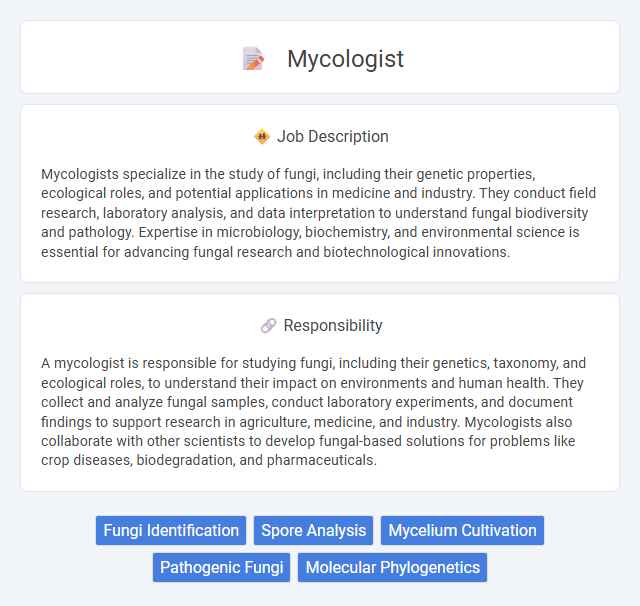
Mycologists specialize in the study of fungi, including their genetic properties, ecological roles, and potential applications in medicine and industry. They conduct field research, laboratory analysis, and data interpretation to understand fungal biodiversity and pathology. Expertise in microbiology, biochemistry, and environmental science is essential for advancing fungal research and biotechnological innovations.
Individuals with a strong interest in biology and fungi are likely to find a career as a mycologist suitable, as the role involves extensive research and lab work. Those who enjoy detailed observation and analysis may thrive, but the job might be less ideal for people seeking constant social interaction or high physical activity. A propensity for patience and a careful approach often increases the probability of success in this specialized scientific field.
Qualification
A mycologist typically requires a bachelor's degree in biology, microbiology, or a related science field, with many positions demanding a master's or doctoral degree specializing in mycology or fungal biology. Expertise in laboratory techniques, fungal taxonomy, molecular biology, and environmental sampling is essential for accurate identification and research of fungi. Strong analytical skills, proficiency in microscopy, and experience with genetic sequencing technologies enhance a mycologist's ability to study fungal species and their ecological impacts.
Responsibility
A mycologist is responsible for studying fungi, including their genetics, taxonomy, and ecological roles, to understand their impact on environments and human health. They collect and analyze fungal samples, conduct laboratory experiments, and document findings to support research in agriculture, medicine, and industry. Mycologists also collaborate with other scientists to develop fungal-based solutions for problems like crop diseases, biodegradation, and pharmaceuticals.
Benefit
A mycologist's role probably offers significant benefits including advancing scientific understanding of fungi, which can lead to breakthroughs in medicine, agriculture, and environmental sustainability. The job may provide opportunities for specialized research, contributing to the discovery of new antibiotics or eco-friendly pest control methods. There is likely a growing demand for mycologists as fungal diseases impact crops and health, increasing job stability and career growth potential.
Challenge
Mycologist careers likely involve complex challenges related to studying fungi in diverse environments, requiring expertise in identification, classification, and ecological impact assessment. Research obstacles may include isolating rare fungal species, understanding their role in ecosystems, and addressing fungal diseases affecting agriculture and health. The need for continual learning to keep up with evolving fungal genetics and biotechnology advancements also probably adds to job complexity.
Career Advancement
Mycologists specializing in fungal biology have opportunities for career advancement through research positions in biotechnology and pharmaceuticals, where their expertise supports innovation in drug development and agriculture. Securing advanced degrees such as a Ph.D. enhances prospects for leadership roles in academia, government agencies, or private industry, focusing on fungal genetics or pathology. Continuous specialization in areas like fungal ecology or mycotoxin research bolsters employability for senior scientist roles and project management positions.
Key Terms
Fungi Identification
Mycologists specializing in fungi identification analyze morphological characteristics and genetic sequences to accurately classify and differentiate fungal species. They utilize advanced microscopy techniques and molecular tools such as DNA barcoding to identify fungi critical for environmental monitoring, agriculture, and pharmaceutical development. Proficiency in fungal taxonomy and database management allows mycologists to contribute to biodiversity studies and the discovery of novel bioactive compounds.
Spore Analysis
Mycologists specializing in spore analysis examine fungal spores to identify species and understand fungal distribution in various environments. They utilize microscopic techniques and molecular tools to study spore morphology, germination patterns, and dispersal mechanisms. Precise spore analysis supports research in biodiversity, agriculture, and medicine by detecting pathogenic fungi and aiding in ecosystem management.
Mycelium Cultivation
Mycologists specializing in mycelium cultivation study and develop techniques to optimize fungal growth for applications in medicine, agriculture, and bioengineering. They analyze substrate compositions, environmental conditions, and genetic factors to enhance mycelium yield and quality. Expertise in sterile lab processes and innovative cultivation methods drives advancements in sustainable materials and biologically derived products.
Pathogenic Fungi
Mycologists specializing in pathogenic fungi study fungal species that cause diseases in plants, animals, and humans, analyzing their biology, genetics, and ecological impact. They develop diagnostic methods and treatment strategies to control fungal infections and mitigate their effects on agriculture, public health, and ecosystems. Their research contributes to advancing antifungal drug development and improving biosecurity measures against fungal pathogens.
Molecular Phylogenetics
Mycologists specializing in molecular phylogenetics analyze fungal DNA sequences to uncover evolutionary relationships and classify species more accurately. They employ techniques such as PCR amplification, DNA sequencing, and bioinformatics tools to construct phylogenetic trees that reveal genetic diversity and lineage divergence within fungal taxa. Their research advances understanding of fungal evolution, ecology, and taxonomy, aiding in biodiversity conservation and the development of novel biotechnological applications.
 kuljobs.com
kuljobs.com